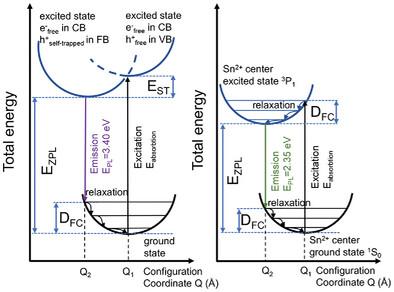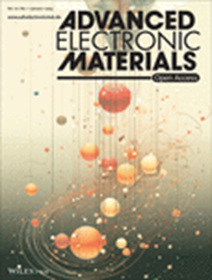Unraveling Abnormal Thermal Quenching of Sub-Gap Emission in β-Ga2O3
IF 5.3
2区 材料科学
Q2 MATERIALS SCIENCE, MULTIDISCIPLINARY
引用次数: 0
Abstract
In this work, the optical transition of self-trapped excitons (STEs) and the emergent green emission in β-Ga2O3 samples with/without Sn impurities at various doping levels have been investigated via temperature- and power-dependent photoluminescence. The ultraviolet (UV) emissions ≈ 3.40 eV unanimously exhibit an excitonic nature related to STEs and typical negative thermal quenching (NTQ) characters. The NTQ activation energy decreases from 103.56 to 42.37 meV with the increased electron concentration from 2.1 × 1016 to 6.7 × 1018 cm−3, indicative of the reduced energy barrier that electrons should overcome to form stable STEs due to the lift-up of Fermi level. In comparison, the green emissions ≈ 2.35 eV with two quenching channels are observed only in samples with Sn impurities at cryogenic temperatures. One channel is the nsnp-ns2 transition of Sn2+, the other is donor-acceptor pair recombination via (2VGa-Sni)2− complex, which is energetically favorable as evidenced by density functional theory calculations. The semi-classical quantum theory models fitting proves the transition from green to UV emissions with elevated temperature. The enhanced STEs emission with distinguished NTQ effect strengthens evidence that the stable polarons inherently limit the transport of holes in Ga2O3, and also support the potential of Ga2O3 materials for the development of UV optoelectronics.

揭示β-Ga2O3 中亚隙发射的异常热淬火现象
在这项研究中,我们通过温度和功率依赖性光致发光研究了不同掺杂水平下含有/不含锡杂质的β-Ga2O3样品中自俘获激子(STEs)的光学转变和新出现的绿色发射。3.40 eV以下的紫外线(UV)发射一致表现出与STE有关的激子性质和典型的负热淬灭(NTQ)特性。随着电子浓度从 2.1 × 1016 cm-3 增加到 6.7 × 1018 cm-3,负热淬活化能从 103.56 meV 下降到 42.37 meV,这表明由于费米级的提升,电子形成稳定 STE 所需的能量势垒降低了。相比之下,只有在低温下含有锡杂质的样品中才能观察到≈2.35 eV的绿色发射和两个淬火通道。一个通道是 Sn2+ 的 nsnp-ns2 转变,另一个通道是通过 (2VGa-Sni)2- 复合物进行的供体-受体对重组,密度泛函理论计算证明了这一通道在能量上是有利的。半经典量子理论模型拟合证明,随着温度的升高,发射会从绿色过渡到紫外光。通过区分 NTQ 效应而增强的 STEs 发射加强了稳定极子本质上限制了 Ga2O3 中空穴传输的证据,同时也支持了 Ga2O3 材料在紫外光电子学发展中的潜力。
本文章由计算机程序翻译,如有差异,请以英文原文为准。
求助全文
约1分钟内获得全文
求助全文
来源期刊

Advanced Electronic Materials
NANOSCIENCE & NANOTECHNOLOGYMATERIALS SCIE-MATERIALS SCIENCE, MULTIDISCIPLINARY
CiteScore
11.00
自引率
3.20%
发文量
433
期刊介绍:
Advanced Electronic Materials is an interdisciplinary forum for peer-reviewed, high-quality, high-impact research in the fields of materials science, physics, and engineering of electronic and magnetic materials. It includes research on physics and physical properties of electronic and magnetic materials, spintronics, electronics, device physics and engineering, micro- and nano-electromechanical systems, and organic electronics, in addition to fundamental research.
 求助内容:
求助内容: 应助结果提醒方式:
应助结果提醒方式:


